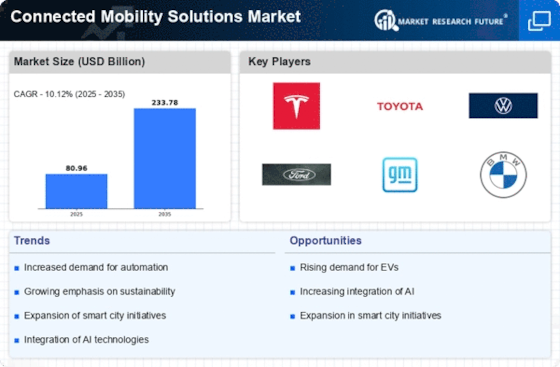Top Industry Leaders in the Connected Mobility Solutions Market

Competitive Landscape of Connected Mobility Solutions Market:
The connected mobility solutions market is a burgeoning ecosystem with immense potential, driven by the convergence of automotive technology, communication infrastructure, and software intelligence. This complex landscape is characterized by a diverse range of players, each vying for a slice of the pie. Understanding the competitive dynamics is crucial for any stakeholder – from established players to aspiring entrants – to navigate this dynamic arena effectively.
Key Players:
- Mitsubishi Motors Corporation (Japan)
- Robert Bosch GmbH (Germany)
- Siemens AG (Germany)
- Cisco System Inc (U.S.)
- Nokia Networks (Finland)
- Molex Incorporated (U.S.)
- Deutsche Telekom AG (Germany)
- HUBER+SUHNER (Switzerland)
- NXP Semiconductors N.V. (Netherlands)
Strategic Maneuvers:
Players in the connected mobility solutions market are adopting a variety of strategies to gain a competitive edge. Some key tactics include:
- Partnerships and Collaborations: Recognizing the interconnected nature of the market, many players are forging strategic partnerships to leverage each other's strengths. For example, automakers are collaborating with tech giants to develop advanced in-car software, while telecommunications companies are partnering with startups to offer innovative data-driven services.
- Vertical Integration: Some established players are opting for vertical integration, acquiring or developing capabilities across the entire value chain, from hardware and software to data analytics and platform development. This provides greater control over the user experience and facilitates data monetization.
- Open Platforms and Ecosystems: Recognizing the benefits of collaboration, some players are developing open platforms and ecosystems that allow third-party developers to create and integrate applications, fostering innovation and enriching the user experience.
- Focus on Data and Analytics: Data is the lifeblood of the connected mobility solutions market. Players are investing heavily in data analytics capabilities to gain insights into user behavior, optimize operations, and personalize the driving experience.
Factors for Market Share Analysis:
Analyzing market share in this dynamic landscape requires considering various factors beyond traditional metrics like revenue or unit sales. Some key parameters to consider include:
- Technology Leadership: Possession of cutting-edge technology and intellectual property can provide a significant competitive advantage.
- Brand Recognition and Reputation: Established brands with strong reputations for reliability and innovation are likely to attract a larger customer base.
- Ecosystem Partnerships and Integrations: The breadth and depth of a player's partnerships and integrations within the connected mobility ecosystem can significantly impact market share.
- Data Management and Analytics: The ability to effectively collect, manage, and analyze data can unlock valuable insights and lead to better service offerings and customer experiences.
- Regulatory Compliance: Navigating the evolving regulatory landscape surrounding data privacy and security is crucial to maintaining market share and user trust.
New and Emerging Companies:
The connected mobility solutions market is constantly evolving, with new players emerging at a rapid pace. Some promising areas of innovation include:
- Autonomous Driving Technology: Companies like Tesla, Waymo, and Cruise are leading the charge in developing self-driving vehicles, which have the potential to revolutionize transportation.
- Electric Vehicle Charging Solutions: With the growing adoption of electric vehicles, companies are developing innovative charging solutions, including smart grids and wireless charging technologies.
- Cybersecurity and Data Privacy: As connected vehicles generate and collect vast amounts of data, cybersecurity and data privacy solutions are becoming increasingly important. Startups like Argus Cyber Security and Upstream Security are addressing this critical need.
Current Investment Trends:
Venture capitalists and private equity firms are pouring billions into the connected mobility solutions market, recognizing its immense potential. Some key investment trends include:
- Focus on Autonomous Driving: Startups and established players developing autonomous driving technologies are attracting significant investments, with companies like Aurora and Cruise raising billions in funding.
- Mobility-as-a-Service (MaaS) Platforms: Investors are recognizing the potential of MaaS platforms that offer seamless integration of various transportation modes, and companies like Uber and Lyft are attracting significant funding.
- Data Analytics and AI Solutions: Companies developing AI-powered solutions for traffic management, predictive maintenance, and personalized driving experiences are increasingly attracting investor interest.
Latest Company Updates:
Jan 3, 2024, Bosch partners with HERE Technologies to develop a real-time traffic prediction platform for connected vehicles. This will help optimize routes and reduce congestion.
Dec 22, 2023, Ford announces plans to launch its Blue Oval Intelligence platform in Europe, offering connected car services like remote diagnostics and predictive maintenance.
Dec 15, 2023, Chinese EV maker NIO unveils its ET7 sedan, featuring advanced autonomous driving features and a high-tech infotainment system.










